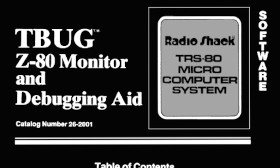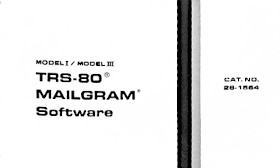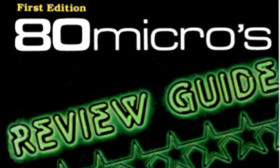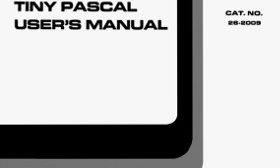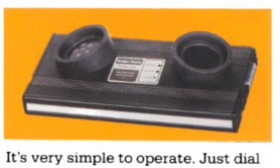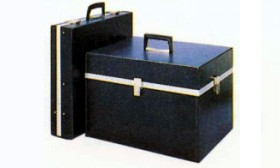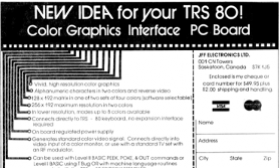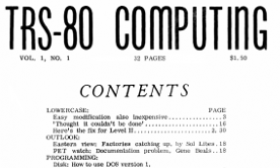T-BUG (catalog number 26-2001), also known as TBUG, was a machine language monitor and debugger for the TRS-80 Model I. It cost $14.95 and came on a cassette with separate versions for Level I and Level II BASIC. (The T-BUG debugger shouldn’t be confused with the Tandy Business Users Group, which was also known as T-BUG.)
Described by some as the “standard” TRS-80 debugger, T-BUG provided an inexpensive way for TRS-80 owners to learn about and experiment with assembly language. Most books about TRS-80 assembly language, such as Earles L. McCaul’s TRS-80 Assembly Language Made Simple and William Barden’s TRS-80 Assembly Language Programming, assumed that the reader owned T-BUG.
(Read more...)
TRS-80 Mailgram (catalog number 26-1564) was a software package that allowed sending Western Union Mailgram messages directly from a TRS-80 Model I or Model III. It was introduced in late 1979 and cost $39.95, not including a Western Union account (which cost an additional $50.00) and per message fees.
The Mailgram service was introduced by Western Union in 1970. Mailgram worked by transferring digital messages to a location closer to the recipient, printing them out, and then mailing them using the postal mail. The process was described this way in a Western Union advertisement from a 1972 Life magazine:
Just call a number shown below (toll-free from most phones). Western Union will transmit your message electronically to a post office near your addressee. And the next business day your Mailgram will be delivered by regular letter carrier.
(Read more...)
80 Micro (originally 80 Microcomputing) was the most popular of the TRS-80 magazines. The book 80 Micro’s Review Guide collected over 500 reviews that were published in 80 Micro during its first three years (1980 to 1983). The reviews (which were abridged) were divided into three broad categories: software, hardware, and books. They were further divided into 27 finer categories, such as word processor, disk drives, and modems.
The back cover stated:
The reviews are taken from the pages of 80 Micro magazine, the leading source of information in the TRS-80 world. Authors include some of the most knowledgeable people in microcomputing, including William Barden, Dan Robinson, Dennis Báthory-Kitsz, Terry Kepner, and Jake Commander.
(Read more...)
Tiny Pascal, also known as “Tiny” Pascal, was a popular programming language for microcomputers. It was created by Kin-Man Chung and Herbert Yuen in 1978 and first described in a three-part series of articles published in BYTE. There were at least four different versions of Tiny Pascal for the TRS-80, although the version sold by Radio Shack was the most popular.
Tiny Pascal was a subset of the programming language Pascal. It contained most of the features of Pascal but was small enough to run well on a cassette-based TRS-80. Tiny Pascal was often used to teach Pascal programming and the Radio Shack catalog described it as a “great introduction to structured programming.”
The first version of Tiny Pascal appeared in a three-part series of articles in BYTE titled “A ‘Tiny’ Pascal Compiler.”
(Read more...)
The TRS-80 Telephone Interface was the first modem that Radio Shack sold for the TRS-80 Model I. According to the product introduction in the November 1978 issue of the TRS-80 Microcomputer News:
Data communications can materially expand your computing horizons. It means you can communicate with large “data base” computers, using your TRS-80 as an intelligent peripheral.
There were two versions of the Telephone Interface: the $149.00 Telephone Interface I (catalog number 26-1170) which was introduced in 1978 and the $199.00 Telephone Interface II (catalog number 26-1171) which replaced it in 1979.
(Read more...)
The TRS-80 System Carrying Case Set (catalog number 26-500), also known as the Model I Carrying Case Set, was Radio Shack’s solution for transporting a TRS-80 Model I. It was introduced in late 1978 for a price of $69.95. Radio Shack increased the price to $75.00 on July 1, 1980 except for a brief sale price of $39.95 that ended December 31, 1980.
Although the Model I wasn’t a portable computer (by any stretch of the imagination), people often needed to move a Model I to a new location. For example, many people kept their Model I at work during the week and brought it back home for the weekend.
The TRS-80 System Carrying Case Set was two cases designed to hand transport a Model I keyboard unit, video display, and associated parts.
(Read more...)
The Color Graphics Interface from JFF Electronics was one of the first color add-ons for the TRS-80 Model I. It cost $49.95 when it was introduced in early 1979 by JFF Electronics Ltd of Saskatoon, Canada. The Color Graphics Interface didn’t require a Radio Shack Expansion Interface but plugged directly into the Model I 40-pin expansion bus. It didn’t include an enclosure but was a bare circuit board. However, it did include a regulated power supply on the board.
The Color Graphics Interface could be connected to either a color monitor or a color television set. It supported several different modes:
- a text display with two colors and reverse video
- a 64 by 192 mode with eight colors
- a 128 by 192 mode with four colors (in two sets)
- a 256 by 192 mode with two colors
(Read more...)
TRS-80 Computing, also known as S-80 Computing, was an early newsletter for the TRS-80. It was published by Computer Information Exchange (also known as CIE) from 1978 to 1980. It cost $1.50 per issue or $15.00 for twelve issues. Although not very many issues of TRS-80 Computing were published, it was a highly regarded TRS-80 newsletter, described by Recreational Computing as “a top-rated publication.”
Computer Information Exchange was an educational nonprofit corporation that was based in San Luis Rey, California and founded by Bill McLaughlin. It sold a variety of low-cost TRS-80 software on cassette, mostly of an educational nature. Their most popular product was People’s Pascal, an implementation of the Tiny Pascal compiler that was created by Kin-Man Chung and Herbert Yuen. Computer Information Exchange sold two versions of People’s Pascal:
(Read more...)
